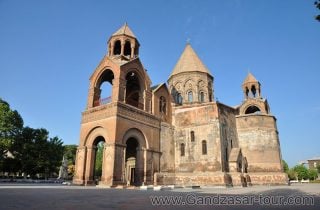Pre-election scandal: a criminal case or violation of ethics?
This week’s topic for the debate in the “Pressing” Club under “168 Hours” newspaper was participation of directors of schools and kindergartens in pre-election campaign, which based on issued recordings are busy recruiting election lists for the leading Republican Party of Armenia (RPA) (The project is implemented in partnership with “DEPOP” Institute for Governance and “AZAD Pharma AG” ltd).
Note, a couple of days ago during the discussion on the topic of “Abuse of administrative resources or election campaign—politicization of education”, Daniel Ioannisyan, coordinator of the “Union of Informed Citizens (UIC)” NGO, issued recordings, according to which RPA urges directors of schools and kindergartens to recruit election lists.
RPA central headquarters reflected to the published materials, stating that the Electoral Code doesn’t ban citizens of the Republic of Armenia to involve in propaganda and organizational works beyond the working hour and responsibilities. “Study of most part of recordings doesn’t give ground to prove that violation of Electoral Code of the Republic of Armenia has been recorded. We are sorry, that the organization assuming the mission of fair and just elections applied to dishonest, politically oriented working manner in its activity. We consider unacceptable the attempt of discrediting citizens of the Republic of Armenia with such provocations despite party belonging and political views,” the statement reads.
The statement issued by Prosecutor General’s Office of Armenia reads,
“A criminal case hasn’t been initiated after publication of recordings of conversations with 114 school directors, who recruited voters for the leading political party, although in one of them crime properties are observed. In case of other 113 recordings elements of administrative violation have been recorded.”
It should also be noted that after publication of those recordings Ohanyan-Raffi-Oskanian (ORO) alliance applied to Central Electoral Commission (CEC) demanding to take recordings into consideration and revoke registration of election list of leading RPA.
Debate is conducted by Satik Seyranyan, editor-in-chief of “168 Hours” newspaper.
Participants of the debate are: Ashot Bleyan, director of “Mkhitar Sebastatsi” educational complex, Serob Khachatryan, education expert, Daniel Ioannisyan, coordinator of the “Union of Informed Citizens (UIC)” NGO, Arevik Anapiosyan, Director at Institute of Public Policy, education expert, Armen Grigoryan, project coordinator at Transparency International Anticorruption Center (TI AC).
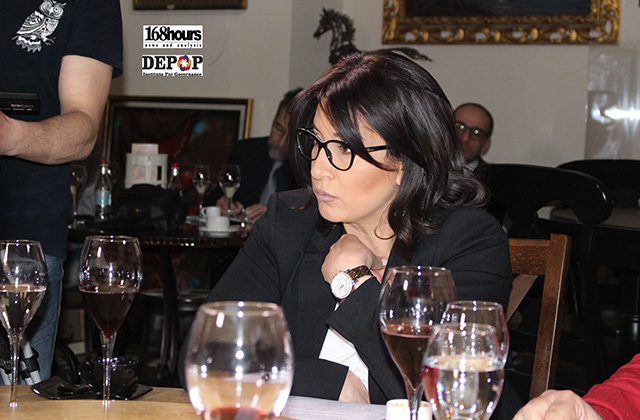
Satik Seyranyan: It should also be added that “Yelk” alliance has also reflected stating that they’ll apply to CEC with the same claim. Of course, calls, condemning statements from reps of other powers have also been recorded, for instance, Naira Zohrabyan from “Tsarukyan” alliance called on the parents to change the schools and etc. First and foremost, I’d ask Daniel Ioannisyan, who published those recordings, provide some information in which condition the issue is, and we should attempt to touch upon the global phenomenon to understand which are the very reasons of that phenomenon and what implication the occurrence may have on educational system. The phenomenon isn’t new, after independency, it’s been 25 years that we are carriers of this phenomenon. What should we do to free from this? Mr. Ioannisyan, you also promised to publish the list of officials, by whose order those directors spread such an activity?
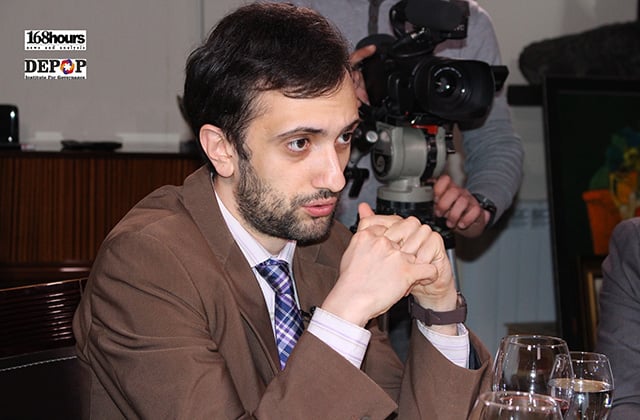
Daniel Ioannisyan: When I say list of officials, I mean the list of names given in these recordings, about whom the directors are speaking and whom, as the directors say, they have passed on the lists. Mostly I mean education departments of communities or administrative districts, regional educational administrations, municipalities, in one case village community centers. Thus, 70% of directors state that they passed on the lists to the very administrative bodies. By this we attempt to mostly show that a pyramid functions here. This publication isn’t a story of 114 bad directors, this is a story of a pyramid of administrative resources, and if we attempt to divide that pyramid into three conditional levels, the lower level are immediately the implementers—directors, who immediately and indirectly gather those lists.
Let’s conditionally call the average circle territorial circles—municipalities, regional governments, communities, which already each of them or maybe from a few dozens of directors they gathers lists. Existence of the first two circles is obvious from recordings: directors accept and give names of the second circle. The third circle, which logically comprises the peak of the pyramid, isn’t clear from recordings. You know it’s logical if in Yerevan and other regions the same mechanisms are functioning, the pyramid has a peak, existence of which to some extent proves reflection of the Prosecutor General’s Office as well. It attempted to approach these recording one by one, however, they should be studied as one integrity. The Prosecutor General’s Office didn’t attempt to fully study and clarify why those directors say that.
Moreover, it should be taken into account that not 114 directors of the Republic are meant, as directors in the Republic are a few thousand, I mean 80% of directors we have called, i.e. we called only 136 directors and they have been randomly selected, and Prosecutor General’s Office should attach attention to this fact as well. We insist and we have edifice that we have called randomly selected 136 directors and we didn’t attempt to clarify their political orientation prior to calling. Our main choice is territorial, when there were a few people from one territory, we were passing on to the other.
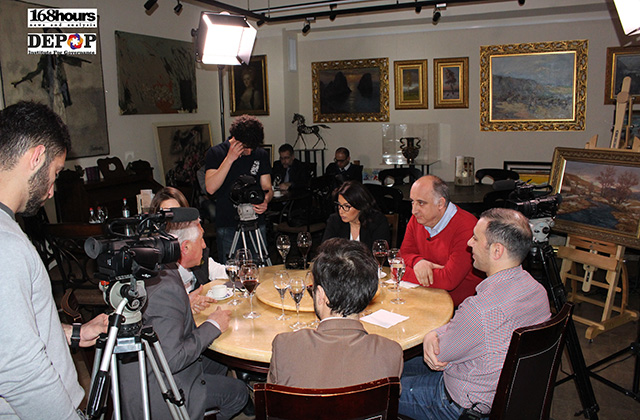
Satik Seyranyan: Mr. Ioannisyan, Armen Ashotyan, Vice President of RPA, former Minister of Education and Science, says your organization, which should have provided assistance and equally observe all political powers, as all political parties gather lists. In his words, you have implemented obvious and unilateral anti-propaganda toward RPA. You’ve only separated RPA directors. There are directors of schools, kindergartens in other political parties as well.
Daniel Ioannisyan: I repeat, this isn’t a story about directors. I don’t exclude that there are people among these directors, who forcedly do this. This is a story on abuse of administrative recourse of a big system. And mass abuse of administrative resources may be implemented only by the political party, which possessed large volumes of administrative resources. For instance, administrative resource of “Yelk” is the municipality of Nor Kyanq village in Ararat region.
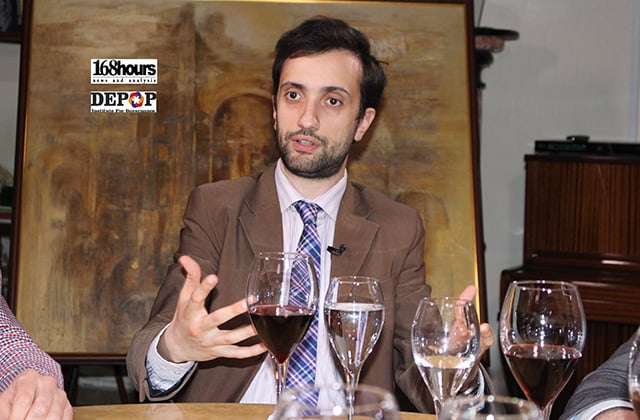
Satik Seyranyan: That’s why I don’t bring the example of “Yelk”. PAP used to be in coalition as well, and if we look per regions, however, we’ll see they possess leverages. ARF (Armenian Revolutionary Federation—Dashnaktsutyun) is in coalition and they also have Dashnak directors…
Daniel Ioannisyan: The only accusation I’ll accept is about Dashnaktsutyon. However, it has administrative resources, Ministers, head of regions and etc., but less than RPA. There were regions with Dashnak head and Minister, and our randomly called directors work for RPA. This means although ARF possesses administrative resource, they have no place for abuse, it’s fictive. Everybody knew RPA was abusing its administrative resources, sane logic says other political parties can’t abuse, as they have no administrative resources (in some sense ARF is an exception), and obviously in seeking abuse of administrative resources we should have sought by the very RPA.
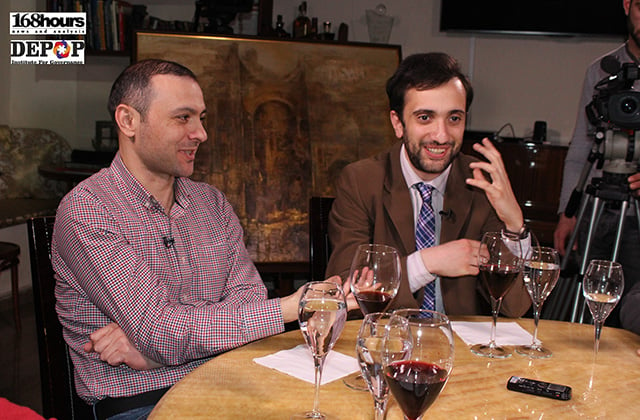
Satik Seyranyan: Garnik Isagulyan, Advisor of NKR permanent representation in Armenia, in one of the interviews mentions the Criminal Code, Article 146 of which bans violation of privacy of correspondence, telephone conversations, postal, telegraphic and other messages. G.Isagulyan also hints that after publication of these recordings it “smells” of an order. Especially, when representative of “Tsarukyan” alliance Naira Zohrabyan appeared with this call.
Daniel Ioannisyan: I don’t know who is my client—is that Naira Zohrabyan, “Yelk” or ORO, or the EU? That Article of the Criminal Code refers to eavesdropping by a third person. Prior to doing this, of course, we consulted our lawyers, who assured that we’re entirely pure. Here an issue of reporting ethics is meant, as those calling were from Sut.am website: does it stem from ethics rules that a reporter calls, doesn’t warn and introduces herself differently…Yes, this is violation of unwritten laws, we don’t deny it, but only of unwritten. Moreover, we have even gone to violation of those unwritten laws out of dominating public interest to explain these stories. Obviously, if we did something differently, if we called and said we are from Sut.am website, we’d have quite different answers and we wouldn’t have the publication we have, and the public wouldn’t know, what it now knows.
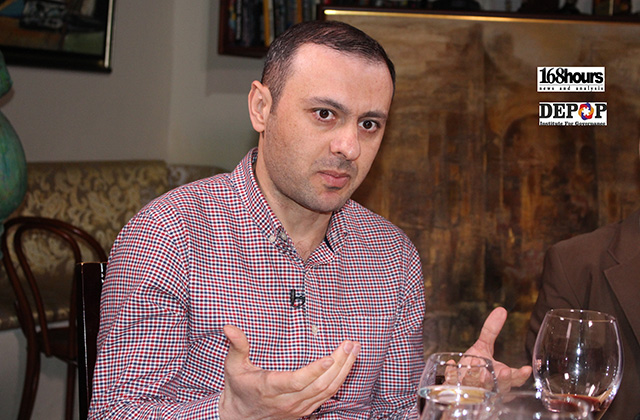
Satik Seyranyan: What should be the reflection of the law enforcement that you considered a really just decision was made and a correct solution has been given to the issue? Political powers demand to evict registration of RPA. Or should the directors be dismissed?
Daniel Ioannisyan: I’m really very little concerned what will happen to the 114 directors. If we call not 136, but suppose 1360, at least 1100 of them would give the same answer, what the 114 have given. These directors are only 114, who weren’t lucky and were “caught”. The less that interests me is whether the directors will be reprimanded or dismissed, perhaps education specialists will say generally how acceptable existence of such figures is. However, this refers not only to the law enforcement, but courts and Central Electoral Commission (CEC) and reflection of state bodies should be rather clear. Firstly, CEC should objectively assess how this could have an effect on election results, and I consider it should apply to the court with the claim to eliminate RPA from campaign.
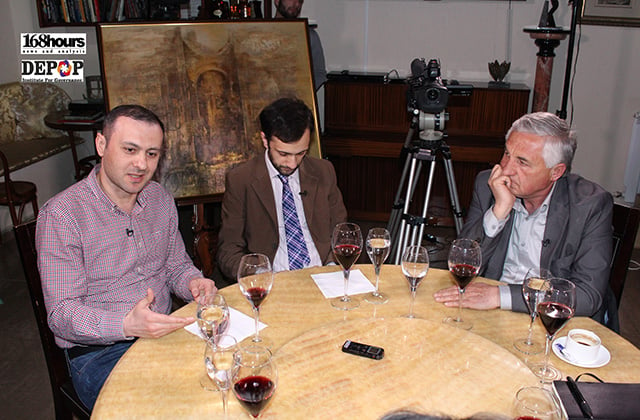
As for the law enforcement, they should study all this in one integrity and not separately. We didn’t see normal reflection of the law enforcement. There was a recording, where kindergarten director tells that an election headquarters of a candidate nominated by preferential voting system is functioning in their kindergarten. A director tells how she scared 1700 people with her husband and until now the law enforcement didn’t reflect to this. They only listen to the recordings, but you aren’t a recording listener, you have numerous tools for criminal investigation, bring them into action.
Satik Seyranyan: Mr. Grigoryan, what do you think what should be done with these directors?
Armen Grigoryan: In fact, as Daniel said this is a systemic issue and the system should be reformed, so that we didn’t face such issues. Generally in Armenia, being an authoritarian regime to some extent, there is usurpation of authorities spreading on all fields, reaching also public education. This is a serious fundamental issue. RPA shows more defensive reaction and it’s clear, that it appeared in a situation that…formerly, as a company implementing observation mission, were always asked: why don’t you speak by facts to us? To do that we attempted to have 1000 observers during Constitutional change, we brought facts, criminal cases have been launched, but most part was freed by paying AMD 450 or 600 thousand penalty, i.e. when even facts are brought, respective steps aren’t taken.
The judicial system depending on the executive body and RPA’s usurpation part, doesn’t allow those changes to be implemented. If, e.g. those directors were punished, it’ll be unjust toward the rest, as surely there are 500-600 people there and they’ll say why they aren’t punished as well. We have serious systemic issue. Every time RPA attempts to speak of reforms, however, a serious issue has been raised, and it shouldn’t be overlooked.
There is another crucial issue as well: if intention of reforms is being constantly touched upon—we are a strong team, ours is the best, we launch reforms…also importance of this information is that everybody knew, however, there were no facts. And when facts were brought and the public was proven by facts, that the issue exists and it has an effect on election processes, a casus situation was established: on the one hand, facts are introduced, and RPA doesn’t want to take any step and doesn’t allow on the other. Even the reflection of the Prosecutor General’s Office you read, doesn’t inspire hope, that it wants to do something. It says there are criminal elements in one case, however, it seems to say it isn’t their affair and you should demand from others. There are serious issues here and by not solving them we enter another crisis. Another infringement toward public trust is recorded. If RPA has a desire to implement changes, and PM Karen Karapetyan constantly touches upon it, systemic solution should be given. It has been repeatedly proposed to depoliticize the field of education and leave it from election processes, bring teachers, directors out from election commissions…
Ashot Bleyan: Decriminalize, as secondary schools aren’t in the political system, they are in a closed system. They have the need to come to the open system and function by the consciousness of public interest. I categorically disagree with you.
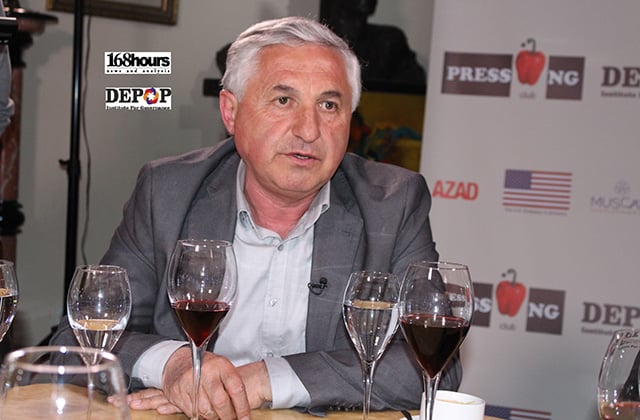
Daniel Ioannisyan: By the way, let me mention that after 2013 presidential elections Tevan Poghosyan had two legislative proposals and both have been refused by the Government.
Ashot Bleyan: It’s discrimination.
Armen Grigoryan: No, it isn’t if members of commission aren’t…

Ashot Bleyan: You should take polling stations from schools, let people not vote in schools. Let parents not vote, as they have families.
Armen Grigoryan: Voting is another issue. If we involve teachers or directors in election commissions, we see that teacher members of election commissions do that election fraud.
Ashot Bleyan: You aren’t involved, that’s why a teacher wants to participate in them.
Armen Grigoryan: It isn’t their wish.
Satik Seyranyan: By urging?
Armen Grigoryan: No, if you aren’t a commission member, the system won’t allow you stay a director.
Ashot Bleyan: Teacher is an employee. First and foremost, try to have the status of a teacher as an employee. Who is the teacher? An unprotected person, who may appear in the street at any moment. The same refers to school directors. Directors of all schools should resign, as they aren’t busy with pedagogics. That’s why I say to him: go and do what you want, but from now on, you haven’t the right to be a pedagogue. It’s been a long time that schools don’t do pedagogy: it’s just a job they do, but it has nothing to do with the teacher, who realizes that he/she works in a political system, as he/she knows—educational program should take part in development of an open society. These repulsive reps of closed estates have appointed the director and time has come—they bring into action their resources. There is nothing new—brotherhood has appointed them, and they demand.
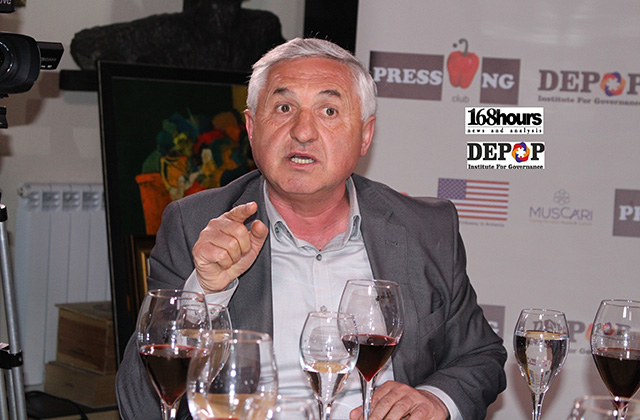
Armen Grigoryan: If we have a systemic issue, we need solutions. Now you say let them free. There used to be freedom, but when we left them free, usurpation of leadership was recorded, they took the schools and have never left that system to function freely. Even on university level all student councils have been politicized and made them party members.
Satik Seyranyan: If people not dealing with social sector or politics speak about this, it’s clear, but when the very Ohanyan-Raffi-Oskanian alliance three reps used to be among the authorities, they all have been elected and appointed for a position by that very way, through authorities, which came to power by those teachers, directors, those lists…And now, when they use this opportunity, fact for political purposes, the issue is being so-called perverted and moved to another platform.
Ashot Bleyan: First, they can’t use for other purposes, as they are in politics, as NA elections are political processes and they, as an alliance and candidates for MP, can and should have political goals, it isn’t a sin.
Satik Seranyan: When Seyran Ohanyan was Armenia’s Defense Minister, wasn’t the army involved? There was another list as well…
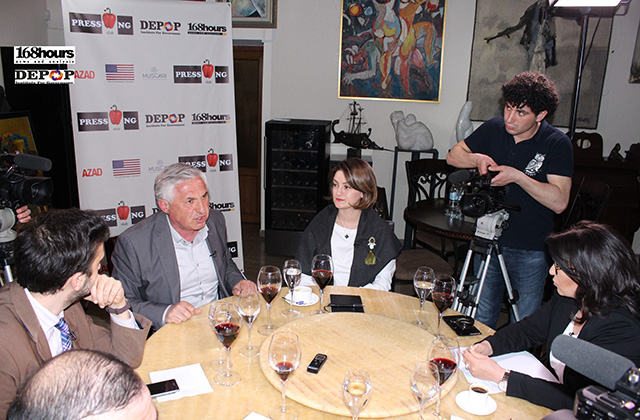
Ashot Bleyan: You mean a leadership rep, who is currently in the authorities, is a PM, president, minister and has the right and former president, minister doesn’t have, did I get you correctly?
Satik Seyranyan: I mean the issue is being manipulated.
Ashot Bleyan: But when he/she participates in a process, he/she should use all vulnerable sides of the authorities. It’s ok.
Satik Seyranyan: I mean, that those very people condemning the phenomenon, the fact, have come to power, took positions through those very lists…

Ashot Bleyan: Leave it to the voter—to me, as I perfectly know who is who, as biographies are available and they are public. In that case it isn’t a topic for our discussion. A much more serious issue exists, which is left out from debates, as unfortunately, school, secondary school or pre-school facility are being touched upon during exams and elections. The rest of the time they seem to lack. In fact, such cases uncover closed holes, an army of 30 thousand of poor employees, called teachers, as if directors, representing them, and a large number of pupils, given “broken buttons” and they’re told to play with them and not to hinder, and they do their job, your time will come…for over 25 years. Generally who are school directors? Now there are higher management bodies in SNCOs—councils. Was a session held in any school on this occasion and did members of that body gather?
Daniel Ioannisyan: People are hopeless.
Ashot Bleyan: Why? Did the law enforcement inspire hope? They suppose that schools, as units, which they were to introduce to the society and by their reps in the council—the authorities…However, as I stressed, they are headed by local authorities, as no one can explain how a school director is appointed—the issue isn’t the order, that exists, as it’s secret consent of a mayor, head of the region. And so, the time comes and that very local authority starts using that closed space by some consent, as it has resources. Can I ask you, who the director a pedagogue is?
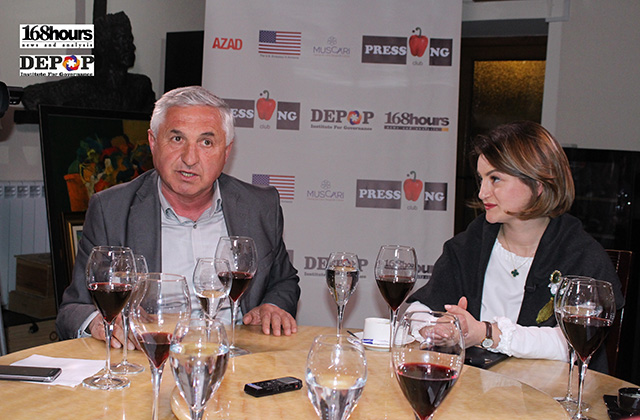
Now dismiss most part of school directors and let them teach or try to find an article written by them in the period of the last 5 years—methodological…School directors aren’t even managers, but people developed by criminal consent, “zone keepers”, who were told: this is your private space, and you’ll follow these or those processes and when the decisive moment comes, you’ll do your assignment…They’re also busy keeping families, as at any moment they’ll be thrown into streets. Who’ll protect them? Parents? If parents generally had their voice, firstly, voting would be voting, and now that school director would stand before the court. This is very serious, integral issue. Integral changes are necessary, finally school should be open, a server of open society, that walls of that fortress were collapsed, doors were open from inside and outside, that the teacher was publicized as a pedagogue.
Satik Seyranyan: Should polling stations in schools be closed?
Ashot Bleyan: It has no connection, as it’s appropriate to the resident. Three from our schools are polling stations, we clean and heat them, as people are coming, it isn’t Bleyan’s schools, they are public areas. By the way, this refers to meetings. How come the resident, parent, can’t meet the candidate for the MP in the school hall? Is this a campaign? What is done is deformity, it isn’t a campaign. What if he/she comes? What connection does a school director have? Each one should have the right. As if they intend to refrain schools—they’re entirely plunged in dirt, forgery, the director is enslaved.
What should you keep a slave from? It’s an ended person, all this should be touched upon. These people found a field of self-defense, as it’s a brilliant opportunity. What will happen after April 2, if suddenly local authorities don’t decide, and is being changed…it’s their end. By directors this is a step toward their self-defense. I don’t justify, as there is pedagogy, for which public education facilities have been established, there is a main hero—the child, and the teacher and school director should serve God, and not to mammon. It’s enough they served Satan, moreover, Satan is the one, who deprives them from that title.
Armen Grigoryan: Mr. Bleyan, the point is that RPA has usurped it and is using that all.
Ashot Bleyan: How should be the issue solved? Through elections. A moment has come that without his/her majesty—voter, there is no solution without his/her decisiveness.
Daniel Ioannisyan: The major obstacle is on making educational institutions party members, and not on politicization. Look, it would be very good if, for instance, in Yerevan State University (YSU) and other educational institutions there were debates, students gathered and posed questions to the candidates. I remember in reply to such a proposal during 2013 presidential elections, YSU rector said its apolitical institution.
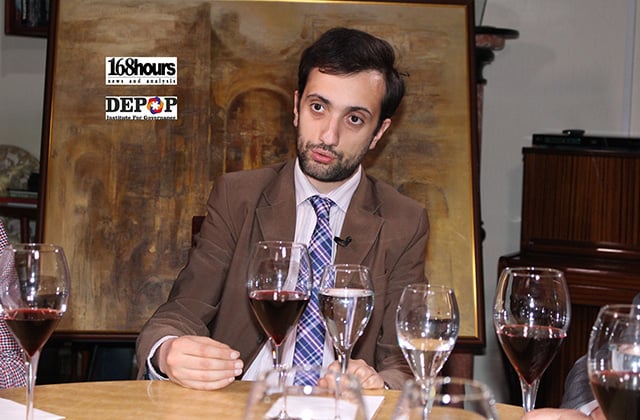
Arevik Anapiosyan: Your perception on what is apolitical, isn’t correct.
Daniel Ioannisyan: Yes, this is the point. They politicize schools, they do what is banned, but what isn’t banned and should be encouraged by logic, they ban it.
Satik Seyranyan: Ms. Anapiosyan, will you draw parallel lines—how is it solved in other countries: politicize, not to make a party member? What to do? Keep educational institutions apart, in particular, schools and kindergartens from election processes? What should solution to this phenomena be not to damage educational system?
Arevik Anapiosyan: Prior to drawing parallel lines, let me mention some important points. We speak of depoliticization of the system and perceive it as made a party member and the reverse process should be launched, i.e. we say one thing and demand another. From 2013-14 reports of different international organizations (including of local organizations) on the field of education are being constantly published and concern is expressed on the field of being politicized. It’s being touched upon that both general and higher education is politicized, we all know about it, research made by the “Union of Informed Citizens” NGO was a proof that it really is. When we say depoliticization, we immediately imagine them not relate to political parties, polling stations shouldn’t be so—we have a serious issue of perception.

Now if we try to give solution by saying dismiss the directors, hang them, set them to fire…it’s going to be an episodic step, they’ll only feel satisfied and that’s it…It’s important to understand why it happened so. It’s been repeatedly touched upon, no one attached attention to those reports. The issue is who choses directors. Directors are chosen by school management councils: they’ve been established attempting to somewhat provide independence of schools. It’s a welcomed step, but schools depending on their subordinates, sign agreements with different people: if it’s a high school, the agreement is signed with the minister, if it subdues municipalities, then with the head of the region, and if it’s a school under Yerevan City Hall, the agreement is signed with the mayor.
Thus, the party to the agreement has the right to dismiss the director. We say they’re chosen by councils: who are included in those councils? School management councils are comprised of 8 persons and 4 of them represent the state. They are from ministries, if it’s under the ministry, one depending on geographical location is either representative of head of the region, or the mayor, and if it’s a school of a municipality, then their reps are three, and one from the ministry. 2 from other 4 are elected by secret ballot from the school board, if 6 are present from the council, he/she is elected with 50+1 votes. This means if all reps of state are present, then the person they want will be elected.
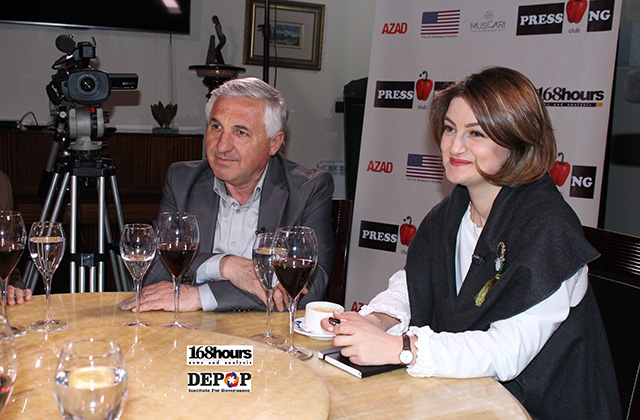
The link rises up to the end: the director is elected and a working agreement is concluded by reps of the very state system, and those very people dismiss them, i.e. if we want to depoliticize, we should reflect to these issues, we should see how the council is formed, who are the members, what liabilities they have and why should the directors sign an agreement with the authorized body and not, e.g. with the council president. If we attempt to change management council members and sign the agreement with the council president, create other mechanisms, which will be able to hold directors accountable (budget, accountability, inspections) in that case we’d be able to provide independence. We aren’t able to keep this way. In fact, they are afraid of losing their jobs, as the union meant to protect interests of a director and teachers, is generally inactive—they solve their fatal issues.
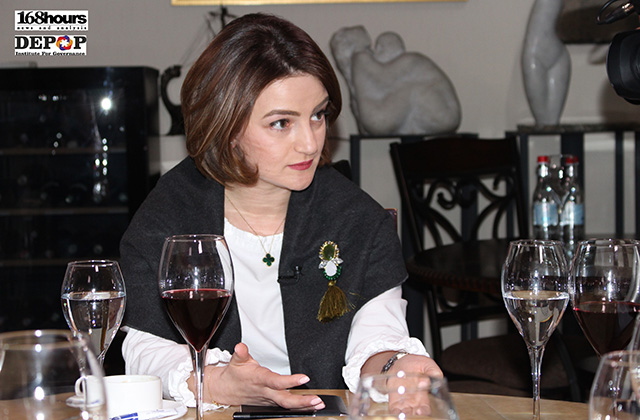
And the next one is our psychological issue. A research was made by one of international organizations, which said educational system very much resembles Armenian family, when the elder one says his word, others obey and here superiors are respective governing bodies, if they say their word and reach till the end by an unwritten law, and directors and teachers depending on directors, obey what is said to them. Such an experience, that being politicized is especially vivid in Sri Lanka, Pakistan, in particular, in conflicting states, where leading political parties come and can entirely change the staff with directors, teachers, moreover, they can have an effect on the content. The issue of being politicized is modern in different conflicting states.
Satik Seyranyan: How should those issues be solved in developing countries?
Arevik Anarpiosyan: An attempt is made to possibly make the educational system independent. We should understand what opportunities does the system create for directors and teachers that they didn’t build integrity and what motivation do they have?
Ashot Bleyan: The issue has no solution if taken separately, independently from the society, all are represented with parents, teachers, authorities…All are represented in school and all want that something was changed in school, only for the reason that they didn’t change, that school director acted trespassing child’s right, that the teacher continued remaining obedient, their subordinate and etc. That’s why I say the issue is in comprehensive changes…
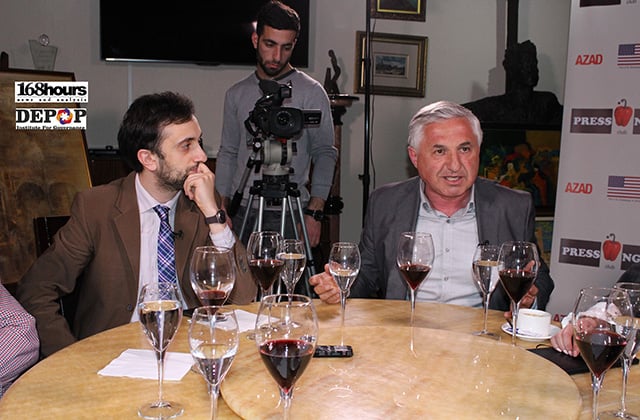
Satik Seyranyan: Mr. Bleyan you used to be a Minister of Culture and Science. Is this an issue difficult to solve or political will and etc. are necessary?
Ashot Bleyan: It isn’t an issue of a separate department. Of course, head of the department bears responsibility regarding the point if he/she sees he/she can’t and disagrees, shouldn’t work as head of the department, e.g. like I didn’t work, as I couldn’t work in that system. Although if there is an intention to put responsibility on one person only, of course he/she can’t what and how should he/she act?
Arevik Anapiosyan: Besides it, the system today is mainly based on qualitative features of individuals. We again attempt to pursue some policy based on individuals, and by ignoring in-depth issues and we move forward by providing episodic solutions.
Satik Seyranyan: Mr. Khachatryan, where are the issues? Reflecting to the issue you wrote on your Facebook page, “I also remind that one of the main reasons of collapse of Greece is considered making teachers political party members and appointing them by bribes. That process launched in Greece in 1993 by PASOK political party. We can’t have a fantastic country, Mr. Prime Minister, as long as schools and kindergartens undergo political operations by your party.”
Serob Khachatryan: Greece’s example is well-known, it wasn’t covered on the level of newspaper articles, but in the book of a thinker on the level of Fukuyama, who provides detailed analysis on reasons of collapse of Greece and among number one issues making schools party members is mentioned, which brought to the fact that number of teachers was enlarged, they attempted to recruit people, make them party members to gain votes, and little by little number of public sector employees grew and collapse was recorded. Look, why all this happens in Armenia and doesn’t in other countries? As countries of the world are divided into two: democratic and non-democratic. For instance, president of Finland or the leading political party will never allow to involve school directors in these processes, as it’s a democratic state. On the other hand, president of Belarus, Uzbekistan or Kyrgyzstan isn’t at all interested in issue of school directors, as they solve their issue in an authoritarian manner, i.e. directors have nothing to do there.
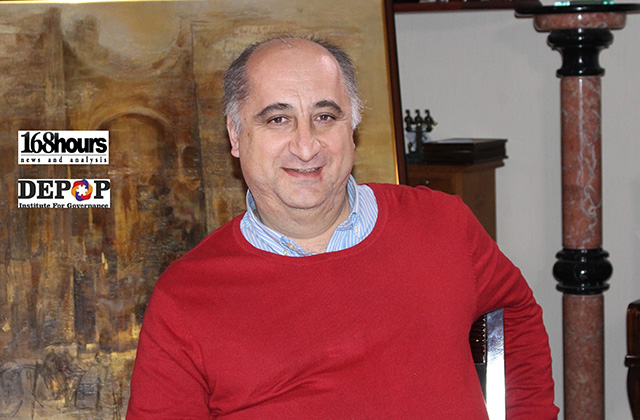
Armenia’s issue is that we have declared ourselves a democratic country, but, in fact, we aren’t such and play democracy, i.e. if you declare something and you don’t follow it, you have to make your social institutes fake, artificial, involve them in dirty games, to show something externally, but do another thing internally. The institute has bended and become fake. A dangerous system damaging education has been established, that system is managed from top to bottom and this is a perfect opportunity for our PM, as yes, there are issues, which may be solved throughout years, but this issue may be solved in an hour.
Satik Seyranyan: Should it be a command or a legislative initiative?
Armen Grigoryan: Maybe political will is enough.
Satik Seyranyan: If as Arevik said, one comes and isn’t true-bred and doesn’t have a political will what should we do? Maybe the issue should be given a power of law.
Serob Khachatryan: Look, no one speaks of this issue in Armenia, there are no trade unions of teachers in Armenia. Mr. Bleyan is correct: the teacher can’t protect himself/herself. In the entire world support of teachers are trade unions, but where is that independent trade union to protect directors if it attempts to go against the system? Currently world’s trade unions fight with the government. A teacher in Finland goes to the street now and demands to raise the salary. A teacher in Armenia not only goes to the street, but says, ok don’t rise for more 10 years, but I’ll serve you. It’s also very important what losses education system has as a result of these developments. Elections will be over, however, I think the damage education system suffers, we won’t be able to overcome for decades if we don’t destroy this system. Upon various indices Armenia’s education is behind year after year. Human Development Report was issued a couple of days ago, where Armenia was ranked the 84th, meanwhile 15 years ago we were the 15th, the 20th.
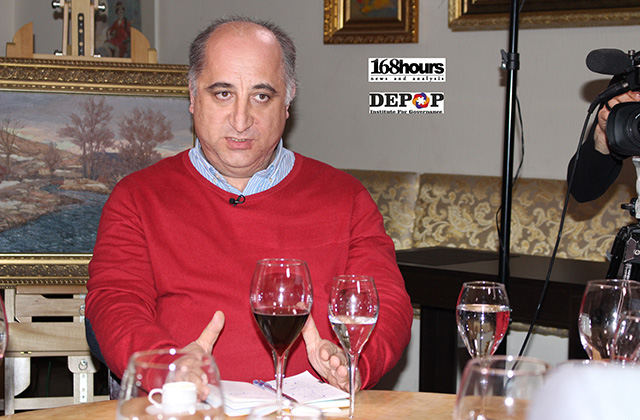
Ashot Bleyan: Serob, that’s why I stressed schools don’t do pedagogy today.
Serob Khachatryan: Yes. When regress in education is recorded in Armenia, are any debates launched covering the reasons or attempting to find solutions or we attempt to hide it?
Let me introduce a few crucial issues. First, education is taking place, when the teacher or the school is an authority, i.e. you can’t teach anything to the child, if you aren’t an authority for him/her. By these processes we totally discredit the school…Currently it’s even supposed that the guilt will be put on Daniel Ioannisyan that he discredits it, but in those very conversations teachers say, “We talked to the parents, we ask for who they’ll cast their votes”…Is that the job of the director? Schools have been discredited prior to these events, as they are in these processes, they do violations during elections. This hinders, school should be an authority. Today we have lost it to restore which decades are necessary, and today children will continue studying worse, if a teacher isn’t an authority, the child can’t learn anything from him/her.

The next important issue: school is a public facility, right? Suppose, 5-10% of population is an RPA member, as 90-95% is non-partisan or members of other parties. How correct is it to massively put reps of political parties on public facilities? Is that desired for parents that their children go to schools led by one political party? It’s unacceptable to me, I want to have schools headed by non-partisan persons, but respecting all parties and not the teachers bend before the party, just the contrary—the party would go and say: respectable director…we have this situation: a system has been established, motivation was passed on.
Currently people are recruited to political parties by their own wish, as there is a psychology—a human always thinks of having an easy life. Of course, he/she may not involve in RPA, but if involved, he/she has issues, his/her life is becoming complicated and one day that council may say: we aren’t electing you, but another person. That’s why directors decide, “I shouldn’t complicate my life and I should write this application, I’ll do what I can” and this is already becoming a phenomenon motivating the system. It’s a contestation—the one to bring more votes, is considered a good director, the one who brought more votes, demands a price then. Mr. Bleyan was correct, there are network issues here, e.g. why a tradition was developed in Armenia, that post of the director is inherited in schools? Upon my assessment this is also linked to elections.
Satik Seyranyan: Are they given honors?
Serob Khachatryan: Yes, if I worked for your party during elections, I ask you to give the price and provide the opportunity to my daughter, son, daughter-in-law, grandson assume my post.
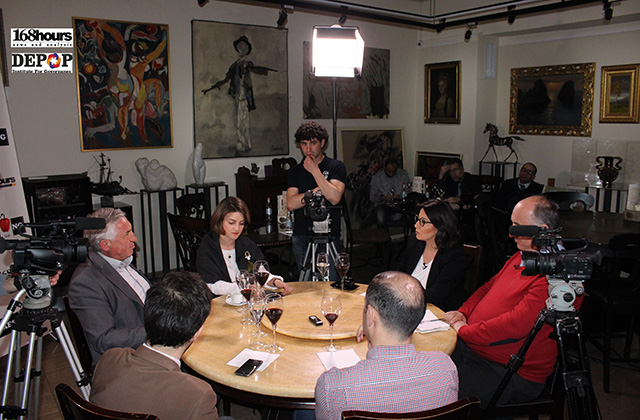
Ashot Bleyan: This is something like a real estate and as it was already privatized, such posts become a real estate.
Serob Khachatryan: That is to say here indirect processes are on—the one working better, receives honors. Very often the teacher with dignity doesn’t want to involve in those dirty processes on the day of elections, is a good specialist, these people little by little are isolated and the teachers working well in those processes are getting noticed. This is becoming a criterion for professional assessment of the teacher.
Ashot Bleyan: Serob, there is a more serious issue as well: if a school director doesn’t manage an educational process, as the school doesn’t do pedagogy, he should be a skillful boy to do such things, to call, to answer, receive a rep from leadership, attend official gatherings, protests, meetings…He should be busy with this, what else can he do?
Serob Khachatryan: Directors may provide lists of creative teachers, and not of those bringing votes. For instance, I wish tomorrow they demanded that list and said give us lists of your creative teachers.
Daniel Ioannisyan: I think we should do our next research with directors, we should call and introduce ourselves and ask when they’ve read a book last time. I’m afraid it’ll be more frightening that in case of lists. In fact, we realize that much won’t change with these elections by this publication, however, at least there is hope that the field of education will be brought to public agenda.
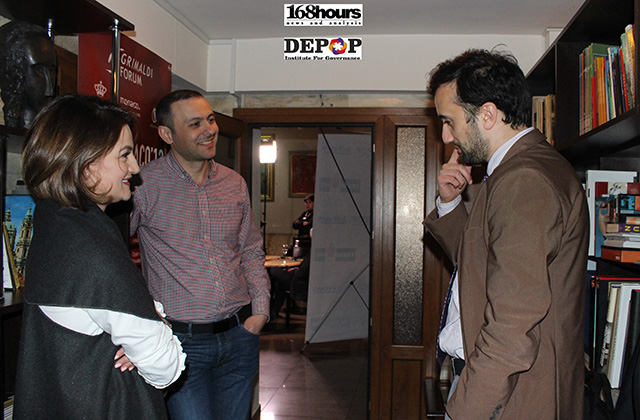
Armen Grigoryan: By the way, regarding Greece there is a curious coincidence as well: until December there were three countries in the world with stabile majority principle in election system—Italy, Greece and Armenia. By the Constitutional change in December Italy refused it, and now we and Greece have it. It’s a fundamental, systemic issue, even if we punished 15-20 directors, fundamental change should be implemented in governance model, and here we should give freedom to that system. School should be free from participating in such processes. Why do such people move forward? As the system also creates a progress of people’s type.
For instance, Finland has a different model: take Armenia’s teachers to Finland and they’ll work by that model, who, I’m sure will fail in that model, but those with that endowment will develop in this model. i.e. we should go to serious systemic changes. I want to demand more from state bodies, as the authorities are responsible for this. The society has its part as well, but as institutional responsibility, for me the authorities have more. Here the authorities have much work to do, it should initiate reforms. Now from the perspective of keeping the power the authorities may think this is a model and we should keep it, but with time this system will decompose and here people will appear like we saw the director giving interview to “Azatutyun”.

First and foremost, the school should have freedom, and an attempt should be made to leave it from election processes. I agree they should be depoliticized, as schools are crucial public institutes, which can’t be apolitical. What is taught at schools it’s our issue. When we’ll have a different model option, when elections are launched by that model, and will be free, transparent, then, it’s possible to record changes here. I hope the authorities will realize that by keeping it under its control only damage is caused from a long-term perspective.
Serob Khachatryan: New tendencies are observed today on giving moral assessments to these processes, but I agree with Armen. In every person there is a so-called kind and evil wolf. The system decides which one you should manifest. Currently a situation has been established in our educational system, when people are encouraged for manifesting their negative sides. Change that system and you’ll see Armenia will have a different army.
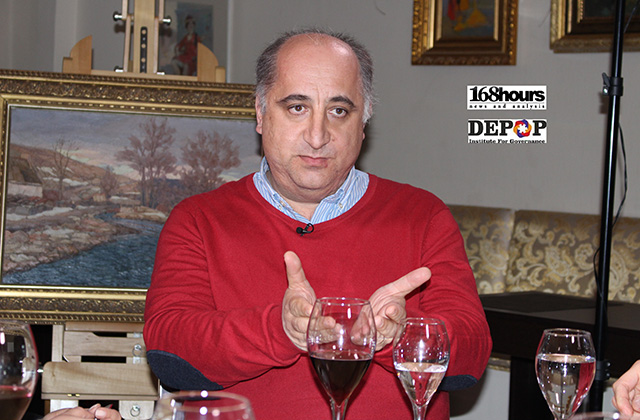
Satik Seyranyan: Will you remember any case, that any director or a teacher refused to participate in election process and he/she was dismissed? I don’t remember such, that any director or teacher opposed and didn’t want to involve in such processes and the authorities dismissed him/her.
Daniel Ioannisyan: It changes an atmosphere, they won’t be eliminated, but maybe next time that director won’t be elected. Maybe some acts will be differently qualified, maybe attitude, funding of that schools will change.
Serob Khachatryan: Let me mention another reason regarding why all this happened. The issue is that when we passed on management of schools to municipalities and kindergartens—to local self-government bodies, it turned out, that e.g. there are 120 schools, 3-4 hospitals, 3-4 cultural centers are under the control of the head of the region, and it turned out that main focus of head of the region was on schools, as it has 150 objects, 120 of which are schools and they started to work on schools more and gradually those political, party issues have grown. It also had its role.
Satik Seyranyan: The society doesn’t show resistance. To say that they opposed—no, they made use of the benefits with pleasure. Does the Law on Education, Law on local self-government bodies, Electoral Code need changes or not? As conditioned by any person, tomorrow, if Oskanian comes to power, nothing will change, if Nikol comes to power, everything will be the same, the issue is systemic and deep, maybe it should be organized by law or should be clarified that it was conditioned by the type or peculiarity of any person.
Serob Khachatryan: No, it won’t be the same.
Satik Seyranyan: Why? Is it conditioned by persons? Let’s understand where the issue should be solved from.
Serob Khachatryan: Let me bring the example of international experience linked to Great Britain, when constant change of the authorities is recorded, teachers already think, “If we enter a political party, and then it changes, we appear in an awkward situation.” I don’t see solution in trade unions. Teachers’ union should be established in Armenia and that political will should be manifested by the government, and not manipulate, become party cells, but really manifest that political will, i.e. leave a room for people, that people, who are against these vicious phenomena, had some protection guarantees.
Arevik Anapiosyan: I consider a few processes should be launched in parallel. Changes of normative field should also take place in parallel with development of those trade unions, as without changing their normative field, we can’t reach solutions.
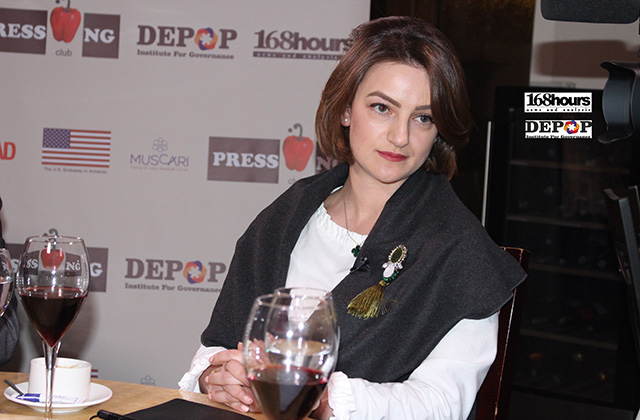
Ashot Bleyan: And salaries of teachers should be sharply raised.
Satik Seyranyan: We didn’t see a case when teachers came to the streets and demanded for rise in salaries.
Arevik Anapiosyan: As they are afraid for their position.
Satik Seyranyan: Not only it, as teachers mostly work as tutors…
Daniel Ioannisyan: I hope this public debate will proceed after elections as well, when all discussions linked to elections will pass, as fortunately, it turned out that the EU intends to invest in the field of Armenia’s education and after this publication they said they’ll take into account follow ups of the publication. I also hope that it’ll have an effect on education and Armenia’s authorities, intending to receive millions of euros, will initiate changes. Despite who’ll come to power, everyone needs money and they’ll undertake reforms and that direction will be public debates as well.
Arevik Anapiosyan: You touched upon a dangerous point: the very moment we put salaries on the ground of debate and say what salary they receive, and what education, quality we demand, here we’re mistaken. It’s the most dangerous, as teacher’s high or low salary depends on economy. So, how long should we wait to record growth in economy and raise of salaries?
Daniel Ioannisyan: I’m sorry, but it isn’t conditioned by economy. It’s unacceptable for me that in our country a policeman receives more, than a teacher. I don’t understand it.
Arevik Anapiosyan: I only mean it’s unacceptable to say that a teacher gets lower salary, that’s why he/she should do tutoring, can become a party member and attempt to gain benefits. We should understand issues from inside, and not what is seen on the surface.
Ashot Bleyan: I think Armenians are afraid of changes, that fear is a shame, as we’ve been plunged so deep that…we should have lived in the lasting regime of changes. I mean changes in all senses— change of regime, work, public life…We have more focused on formal changes. The authorities shouldn’t be afraid of changes, should be brave, as it’s a capable leadership, and after a very short period demand for a gifted person will be recorded.
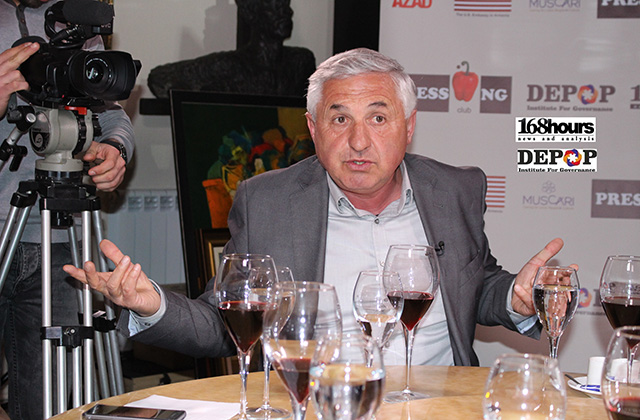
Serob Khachatryan: First and foremost, political will is necessary, the authorities should consider that future of education of our children is thousand times more important that their keeping power, i.e. we shouldn’t endanger the country for the sake of power. Secondly, motivation system should be changed, i.e. if we change motivation system and put literacy, creativity, pedagogy on its basis, you’ll see that people distinguished during elections will go down and those poorly giving lessons at schools and avoiding to engage with their dirty games, will raise. Thirdly, trade unions should be established, which should be a counterbalance, which should protect teachers from the government, especially, in likewise processes.
Armen Grigoryan: First and foremost, it’s important that the authorities really undertook in-depth changes. Looking to election figures, I can say that they’re doing a job, however, in fact, in election results they have to change figures in other places as well. After this much work they have to do other forgery and don’t even win, as a result, an entire educational system suffers from it. Serious changes should be implemented, the society may also demand.
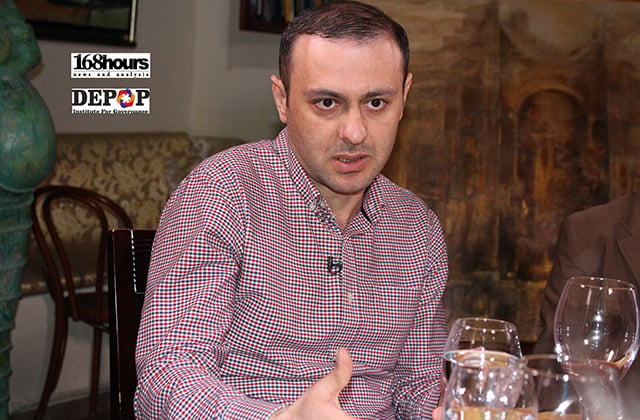
Arevik Anapiosyan: I stress depoliticization, it should be depoliticized in the legal field. I also consider the community doesn’t realize importance of its role in public education: both parents have that approach of adaptation, and to some extent depending on the teacher and the school as well, they adapt to it. Consciousness of parents’ community should be risen, they can play an important role in the field of public education.
Daniel Ioannisyan: To say, that we’re waiting that CEC will eliminate RPA from the campaign, slightly said, will be a naivety, CEC doesn’t even record minor violations…To say that elections will be cancelled if anyone will claim in the Constitutional Court (and statistic shows that always there are people, who appeal), will be naivety as well. I consider Armenia’s authorities were planning to have pure elections at the polling stations and in the end state, “Look, finally, we are legitimately elected leadership.” I think this failed a bit. After this story it’ll be difficult to stand with an open forehead and say elections were free and fair. If formerly they were stating on abuse of administrative resource, but there were no facts, then this story of school and kindergarten directors changed that reality.
“Pressing” Club is implemented in partnership with “DEPOP” Institute for Governance and “Azad Pharma AG” Swiss Company

Ani Keshishyan
Razmik Martirosyan
Photos—“168 Hours”









